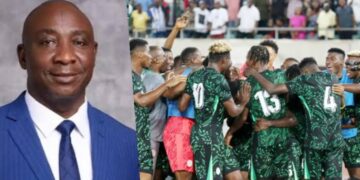The event also celebrates Mr Soyinka’s 90th birthday and the 60th anniversary of his first visit to Cuba.
Nobel laureate, Prof. Wole Soyinka, has been honoured with the Casa de las Americas the Haydee Santamaria Medal by Miguel Diaz-Canel, first secretary of the Central Committee of the Communist Party of Cuba and President of the Republic, on behalf of Cuba and at the proposal of the minister of culture.
As reported by the Presidency on X, Jorge Fornet, director of the Center for Literary Research of Casa de las Americas, in his remarks of praise, said that awarding Mr Soyinka the medal that bears the name of that extraordinary woman is an act of justice that honours them.
After the ceremony, Diaz-Canel held a meeting with Mr Soyinka, where he thanked her for his visit in such a complex moment for Cuba.
The president noted that it was the visit of a brother who has always been fighting for the most just causes.
The Haydee Santamaria Medal is conferred to national and foreign citizens and groups who, over the years, have shared the main objectives of the Casa: the enrichment, defence and integration of the genuine cultures of our region and the entire South.
The event also celebrates Mr Soyinka’s 90th birthday and the 60th anniversary of his first visit to Cuba, where he has returned on several occasions.
The playwright, who during the tribute had stated that “Cuba is also my home,” referred during the meeting to the strong ties that unite the island and Africa.
The 63rd anniversary of the Union of Writers and Artists of Cuba coincided on Thursday with the presentation of the organisation’s Dulce María Loynaz International Prize to the Nigerian poet and 1986 Nobel Prize winner in Literature, Mr Soyinka, who, on receiving the prize from the president of Uneac, Marta Bonet, expressed his happiness and also his heart at being back in the bosom of a creative family.
Mr Soyinka confessed to having had great political and cultural adventures in Cuba, recognising the indispensable role played by the Antillean nation in the liberation of the African continent, something that, according to the critic and essayist, we must not allow ourselves to forget, because Cuba has shown that both the pen and the weapons of liberation count in achieving the sovereignty and self-determination of our peoples.
Shortly before the award ceremony, theatre critic and theorist Omar Valiño described Mr Soyinka in his eulogy as a consistent man, highlighting the sincerity and intelligence of his work, which draws on the ancestral wisdom of Yoruba culture.
The director of the José Martí National Library of Cuba, in a cultural ceremony in front of writers and artists, recalled the words of Mr Soyinka when he said that “as is well known, Cuba is part of the African continent by will, not by chance,’’ so his vision – he said – adjusts a geography beyond the physical space, synthesising the centuries-old relationship between Mother Africa and the Caribbean island.
His phrase, like no other, sums up the bond of solidarity and detachment that Fidel and the Revolution have maintained for the benefit of the black continent, through a military, medical and educational epic that has gone down in history.
Mr Soyinka’s political or civil struggles, which once cost him persecution or imprisonment, are a landmark for present and future generations, so it is a priceless privilege to have him among Cubans and Africans today.




































